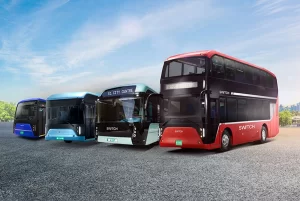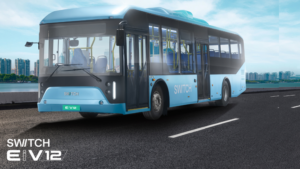The Indian electric bus market is poised for remarkable growth, and we at Switch Mobility are committed to driving innovation and sustainability in this sector said Mahesh Babu, CEO of Switch Mobility, in an interaction with Bus Coach India Magazine. With strong demand from both government and private players, we are optimistic about the future and look forward to contributing to the country’s clean mobility revolution.
Q: The Indian electric bus market is experiencing remarkable growth. How does Switch Mobility position itself in this evolving landscape?
The Indian electric bus market is indeed at a pivotal juncture, witnessing unprecedented growth. At Switch Mobility, we are fully committed to driving innovation and sustainability in this sector. With strong demand from both government and private players, we remain optimistic about the future and look forward to contributing to India’s clean mobility revolution. Our focus has always been on offering cutting-edge technology and efficient solutions that cater to the country’s urban and intercity transport needs.
Q: Could you tell us more about Switch Mobility’s electric double-decker buses and their presence in India?
Our electric double-decker buses, which we refer to as high-corner double-deckers, have already made a significant impact in the electric mobility space. At present, we have 50 such buses running successfully in Mumbai, and their performance has been exceptional. The response from passengers and operators alike has been overwhelmingly positive.
We have also expanded our footprint to cities like Ahmedabad, Hyderabad, and Kerala. Recently, we delivered five electric double-deckers to Bhubaneswar, and we have received an order for 20 more from Uttar Pradesh. Furthermore, there is a growing interest from multiple states, with several inquiries coming in for our double-decker buses. This unique offering sets us apart in the market, as we are currently the only manufacturer providing this solution. While winning tenders can be challenging due to the requirement of multiple bidders, the enthusiasm from various state governments has been very encouraging. Given this momentum, we anticipate manufacturing between 100 to 200 double-decker buses in the coming year to meet the rising demand.

Q: What are your investment plans for electric buses in India?
Our strategy is centered on both the passenger and light commercial vehicle (LCV) segments. In the passenger category, we aim to provide a diverse range of electric buses, spanning from 13-seaters to 65-seaters, including our flagship double-decker variant.
In the LCV segment, we are developing multiple products in the up-to-7.5-ton category. Our electric bus lineup already includes the Switch EiV 12 Standard Floor Bus, which has been in the market for two years. Recently, we introduced the Switch EiV 12 Low-Floor City Bus, designed specifically for urban transport. Apart from these, we have developed the Switch eVan, targeted at the European market. Our electric double-decker bus remains a key highlight of our product portfolio.
Additionally, we are actively working on a new 9-meter platform, which is progressing swiftly. Over the next two to three years, we aim to establish a full range of electric buses, including 7-meter, 9-meter, 12-meter, double-decker, and coach buses. This expansion will allow us to cater to diverse mobility needs across India.
Q: What is Switch Mobility’s current production capacity for electric buses?
Our current production capacity stands at approximately 3,000 electric buses per annum. However, through our strong association with Ashok Leyland, we have the flexibility to scale up production to 6,000 buses annually. This scalability ensures that we can efficiently meet the increasing demand.
Similarly, in the LCV category, we have already introduced the iV3 and iV4 models. At the Bharat Mobility Show, we showcased the V8 model, which falls under the 7.2-ton category. Our existing portfolio also includes vehicles with Gross Vehicle Weights (GVW) of 4.5 tons and 3.5 tons. We are excited about further expanding our LCV offerings in the near future.
Q: How do you view the future of the Indian electric bus market?
The Indian electric bus market is growing at an unprecedented rate. Last year, around 4,500 electric buses were operational in India, and this year, that number is expected to rise to 6,000. On a global scale, including the UK, we anticipate a total demand of 6,000 to 7,000 electric buses. Interestingly, India is keeping pace with other countries in EV adoption. Even in the U.S., the number of electric buses is currently lower than in India.
The Total Cost of Ownership (TCO) of electric buses has proven to be highly viable, particularly with the Viability Gap Funding (VGF) provided by state governments. As a result, every State Transport Undertaking (STU) is eager to transition to electric buses to lower operational costs. Given this momentum, I strongly believe that in the next 10 to 15 years, most city buses in India will be electric.

Q: Are you collaborating with private players to boost electric bus adoption?
Yes, we have been actively collaborating with private operators to accelerate electric bus adoption. One of our key partnerships is with Chalo, to whom we have supplied a fleet of fully electric buses. Currently, they operate 20 luxury AC reclining coaches in Mumbai, providing point-to-point services for office commuters between major areas like Andheri and other key locations.
Additionally, we are in discussions with several new private players who are eager to integrate electric buses into their fleets. We believe that as private sector participation increases, the overall EV ecosystem will continue to strengthen.
Q: Could you tell us about the role of your Lucknow plant in Switch Mobility’s expansion?
Our Lucknow plant is a crucial part of our expansion strategy and is expected to be operational by mid-2025. This facility will focus on manufacturing electric buses and will complement our Chennai plant. By strategically distributing production between these two locations, we can ensure efficient deliveries and prevent capacity constraints.
Q: Is Switch Mobility planning to establish an R&D center in Lucknow?
Currently, our R&D centers are located in the UK and Chennai, and we will continue to operate them from there. However, the Lucknow plant will primarily focus on manufacturing. That being said, in the long term, we may reassess our R&D strategy and consider expanding research capabilities in different locations based on our business needs.
Q: Safety remains a major concern for electric vehicles. How does Switch Mobility ensure the safety of its electric buses?
Safety is our top priority, and we have implemented three levels of protection in our electric buses. Firstly, our vehicle software incorporates multiple layers of monitoring and control to ensure operational safety. Secondly, our battery packs are designed with proper venting systems to enhance safety and prevent thermal incidents. Lastly, we equip our buses with a Fire Detection and Suppression System (FDSS), which immediately suppresses any fire in its early stages, minimizing risks for passengers.
Unlike other manufacturers who only offer fire detection and alarm systems, our FDSS provides an additional layer of protection, ensuring that the likelihood of safety issues is extremely low. With these comprehensive safety measures, we remain committed to delivering secure and reliable electric mobility solutions.